| dc.contributor.author | Hildyard, Nicholas | en |
| dc.contributor.author | Wilks, Alex | en |
| dc.date.accessioned | 2016-02-24T15:09:47Z | |
| dc.date.available | 2016-02-24T15:09:47Z | |
| dc.date.issued | 01/04/1998 | en |
| dc.identifier.citation | Hildyard, N. and Wilks, A. (1998) An Effective State? But Effective for Whom?. IDS Bulletin 29(2): 49-55 | en |
| dc.identifier.issn | 1759-5436 | en |
| dc.identifier.uri | https://opendocs.ids.ac.uk/opendocs/handle/20.500.12413/9170 | |
| dc.description.abstract | Summary Neoliberal rhetoric has urged the reduction of the state's role, but in many ways state power and spending have merely been redirected rather than reduced. WDR97 urges states to become effective, but does not say for whom. The World Bank's biases are seen in the WDR's economistic approach to political issues, limited view of participation, blindness to corporate power and support for the use of international mechanisms to lock in government policies. The views expressed in WDR97, combined with the poor record of the World Bank's privatisation and public sector reform loans, suggest the need for great caution as the World Bank seeks to move further into institutional reform. | en |
| dc.format.extent | 7 | en |
| dc.publisher | Institute of Development Studies | en |
| dc.relation.ispartofseries | IDS Bulletin Vol. 29 Nos. 2 | en |
| dc.rights.uri | http://www.ids.ac.uk/files/dmfile/IDSOpenDocsStandardTermsOfUse.pdf | en |
| dc.title | An Effective State? But Effective for Whom? | en |
| dc.type | Article | en |
| dc.rights.holder | © 1998 Institue of Development Studies | en |
| dc.identifier.doi | 10.1111/j.1759-5436.1998.mp29002006.x | en |

